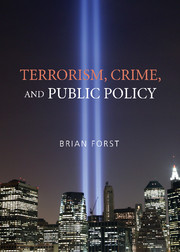“This is a very useful book. Anyone who plans to study terrorism will wish to have this excellent overview – and list of sources – on their desk."
– Amitai Etzioni, author of Security First: For a Muscular, Moral Foreign Policy and Professor of International Relations at The George Washington University
“Finally, a well-researched, objective analysis based in integrity . . . by a leading American scholar of the larger issues and dilemmas engendered by the events of September 2001. Brian Forst is a beacon of moral clarity in a dark world.”
– Ambassador Akbar Ahmed, Ibn Khaldun Chair of Islamic Studies, American University
“Brian Forst has written a carefully reasoned text on terrorism in its many historical and contemporary manifestations. His discussion of rational short- and long-term responses to terrorism is masterful. He shows the relevance of criminology to the problem of terrorism and the fear it engenders, while insisting that terrorism differs in important respects from conventional crime. I strongly recommend this book to instructors in courses on terrorism and its control and to anyone interested in why terrorism has become a major contemporary problem and how to manage it.”
– Richard Rosenfeld, Curators Professor of Criminology and Criminal Justice, University of Missouri-St. Louis
“Terrorism, Crime, and Public Policy provides students, researchers, practitioners, and policy-makers with the single most authoritative treatment of the literature and issues surrounding the study of terrorism. Its inter- and multi-disciplinary survey of the knowledge base on the nature and sources of terrorism and the interventions that can serve to remove its causes and decrease its incidence is an exemplar of how the fields of criminology, criminal justice, and law and society cannot be – and should never be – considered in isolation. Combined with the accumulated knowledge from psychology, history, sociology, political science, and other fields, Professor Forst has struck the ideal balance between universality and relevance in discussing the critical issue of public policy. All of us will learn more about terrorism than when we first opened the book, and all of us will walk away coming up with many more research questions, which is the goal of education and scholarship.”
– Professor Alex R. Piquero, Department of Criminology and Criminal Justice, University of Maryland College Park
“The 20th century’s rhetorical ‘war on crime’ has in important ways yielded to a 21st-century rhetorical ‘war on terrorism.’ With a jeweler’s eye, in Terrorism, Crime, and Public Policy Brian Forst combines a rationale and method for understanding and developing public policy to address terrorism, based in part on the advantages of improved criminological thought. That thought requires a deep and sophisticated understanding of the multiple contexts, symbols, and meanings of terrorism; a clear explication of the differences among a wide range of acts that constitute ‘terrorism’ (all terrorism, like all crime, is not the same); and the specification of both short- and long-term interventions that address proximate and root cause.
Like crime, terrorism has many root and proximate causes, meanings and interpretations, and implications and consequences. And, like crime, approaches to effectively and lawfully addressing terrorism and its consequences are most likely derived from probing and thoughtful analysis, rather than knee-jerk or fear-inspiring policies that intentionally or unintentionally mask terrorism and its dynamics.
Terrorism, Crime, and Public Policy is a very well-reasoned assessment of the many strands of thought that comprise our understanding of terrorism, its genesis, and possible ways to ameliorate its effects. Brian Forst has done us all service in artfully linking history, religion, politics, and philosophy to the range of public policy choices the world faces in dealing with terrorism, drawing from his deep understanding of crime and public policy.”
– Jack R. Greene, Professor, College of Criminal Justice, Northeastern University, Boston
“Terrorism, Crime, and Public Policy is a comprehensive review of the origins and nature of terrorism and of public policies for responding to it. With sound, balanced judgment, Brian Forst covers difficult and controversial subjects, from the ‘clash of civilizations’ debate to the 2001 Patriot Act. I highly recommend this excellent book.”
– Samuel Walker, Professor Emeritus of Criminal Justice, University of Nebraska at Omaha
“The treatment is comprehensive and the presentation is engaging. Forst skillfully blends academic insights with critical policy concerns. By appealing to a new generation of students, this book will help establish a larger social science footprint in an area where it is sorely needed.”
– Gary LaFree, Director, START, National Center for the Study of Terrorism and Responses to Terrorism, University of Maryland
“Whenever Brian Forst addresses a new subject area, he comes at it with a broad lens, bringing both openness and a good analytical foundation. The result is usually something enlightening for both the experienced hand and newcomer. This text is no exception. I especially like his linking of some of the standard academic arguments with those that are taking place in the elite press. This is another way to engage students who are familiar with the arguments in the press and a way to educate those who are ignorant of the elite press. I really got a kick out of the pictures of the various commentators, folks I had read but never seen. It lessens the awe with which these people are viewed and lets students feel that they too can participate in the debate. This is a great introductory text: enjoyable to read, comprehensive, and fair.”– James P. Lynch, John Jay College of Criminal Justice, City University of New York



